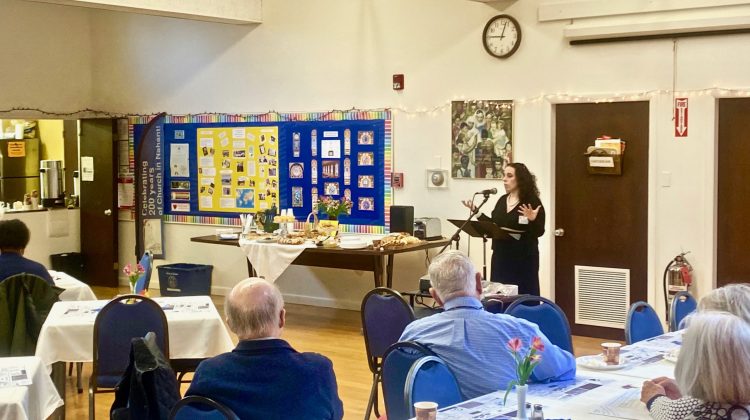NAHANT — Rabbi Margie Klein Ronkin, a lifelong activist and executive director of the Essex County Community Organization (ECCO), spoke to roughly 35 residents about the importance of affordable housing and the issue’s roots in racial justice at Nahant Village Church Friday morning.
As community members dined on eggs, pastries, and coffee, Rabbi Ronkin said that while she rallied for economic and racial equality in the early 2000s, she noticed that conservative activists used church congregations to garner support for their policies.
That inspired Rabbi Ronkin, at the helm of ECCO, to spread her advocacy to 59 places of worship across the region.
Introducing the housing crisis as the morning’s main topic, Rabbi Ronkin said the COVID-19 pandemic was the straw that broke the camel’s back for a number of low-income families throughout the nation that had already been struggling to pay rent.
“When the pandemic came, it was just like revealing the precarity of everyone’s lives. When people couldn’t work, they just immediately couldn’t pay their rent, and people were being evicted,” Rabbi Ronkin said. “There were like life and death consequences to not having a place for all of these people to live.”
Rabbi Ronkin said the lack of affordable housing predominantly impacts minorities because after World War II, government-subsidized mortgages and other affordable pathways to homeownership were offered almost exclusively to white Americans.
In some cases, Rabbi Ronkin said government-subsidized homeowners’ agreements contained specific clauses prohibiting homeowners from selling their houses to people of color.
“They wound up creating separate housing projects for Blacks and whites. In the late ’40s, and ’50s, the Federal Housing Administration guaranteed loans to suburban subdivisions, like Levittown, that they built. The government was building nice housing, but with the explicit condition that Black families were prohibited from living there,” Rabbi Ronkin said.
Even after passage of the 1968 Fair Housing Act, which prohibited racial discrimination in housing, Rabbi Ronkin said historically discriminatory housing laws gave white families a significant boost in generational wealth, while minorities typically rented. She cited a 2015 Federal Reserve Bank of Boston report that showed the median net worth for Black households was $8 compared to $247,500 for white households.
Rabbi Ronkin said ECCO has advocated for cities and towns in the area to allocate significant portions of their American Rescue Plan Act funding toward the creation of affordable-housing units and rallied residents around municipal zoning changes that expand local housing markets, such as allowing the use of accessory dwelling units.
Nahant recently published its five-year Housing Production Plan this week in an effort to comply with Section 40B, a state law requiring cities and towns to reserve roughly 10% of their housing stock for affordable housing, and Section 3A, which requires each municipality located within 1.5 miles of an MBTA station to zone a portion of its land for multifamily housing.
Rabbi Ronkin said that although municipalities risk significant state fines and penalties, some towns have been reluctant to pass Section 3A zoning ordinances.
“In one town that we’re working with, our opposition said ‘We really don’t want those kinds of people in our neighborhoods.’ The attorney general, Andrea Campbell, is now going to sue the town,” Rabbi Ronkin said. “One of these towns said, ‘Maybe we should just remove our MBTA station, because it would be better to not have public transportation than to have those kinds of people…’ This sense of ‘not in my backyard’ is really strong.”
When residents asked Rabbi Ronkin what they can do to advocate for affordable housing in their neighborhood, she responded that Nahant’s small size and its use of the Town Meeting system give residents an advantage in their ability to potentially change the housing landscape.
“If you can just organize enough people, then you win. When the decision-makers are the people in town, there may be a lot of people against you, and then there’s an uphill battle, but it’s only about the people that show up to Town Meeting,” Rabbi Ronkin said. “I hope that people will support the idea that we can move forward incrementally, step-by-step, and together do a good thing.”

